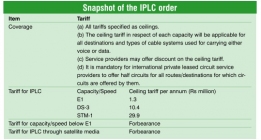
Surrounded by controversy, the issue of international bandwidth tariffs has been on the backburner for many months now. However, recently, TRAI has decided to carry out TDSAT-mandated disclosures and redetermine tariffs as part of its 39th amendment to the Telecommunications Tariff Order.
According to TRAI, tariff regulation for bandwidth has become necessary as the market is not yet adequately competitive. Bandwidth prices are much higher in India than globally. This has skewed the market structure and been detrimental to competition. It has become important to correct this, especially in light of the fact that IPLC services are critical to the penetration of broadband/internet services as well as to IT and IT-enabled services.
Briefly, TRAI has fixed ceiling tariffs for three of the most commonly used capacities, that is, E-1 (speed of 2 Mbps), DS-3 (speed of 45 Mbps) and STM-1 (speed of 155 Mbps). The ceiling tariffs for IPLC (half circuit) in respect of E-1, DS-3 and STM-1 capacities are Rs 1.3 million, Rs 10.4 million and Rs 29.9 million per annum respectively. These ceiling tariffs will result in a reduction of 29 per cent, 64 per cent and 59 per cent in tariffs for E-1, DS-3 and STM-1 capacities respectively (as compared to the existing listed price prevalent in the market for India-USA).
The prescribed ceiling tariff will be applicable to all destinations, capacities and types of cable systems used for carrying either voice or data. The new tariffs take effect from September 16.
The ceiling has been determined on the basis of the historical cost of the incumbent adopting the top-down approach and forward-looking cost concepts.
This is the second time that the regulator has attempted to bring down international bandwidth tariffs. VSNL had opposed TRAI's earlier March 2005 order, which had brought down the international bandwidth tariff ceiling by 70 per cent. It got a stay order from the telecom tribunal on the grounds that it was based on inaccurate cost estimates. TDSAT directed TRAI to take a fresh look at the matter after sharing with VSNL the relevant material based on which the tariff had been fixed.
TRAI has complied with the TDSAT directive and proceeded to share the information on details of cost calculations with VSNL with the objective of finding a quick remedy for user industries and consumers at large who continue to pay high tariffs for IPLCs.
Meanwhile, TRAI has filed an appeal with the Supreme Court on the larger regulatory issue of the extent of transparency required while discharging functions such as tariff fixation.